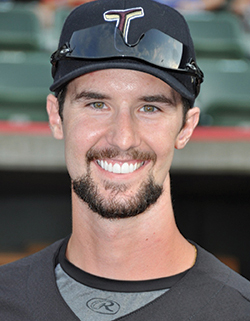Salivary Gland Cancer Survivor
Don’t Forget to Keep Living
 Jimmie “Hooty” Wade was diagnosed with salivary gland cancer at 17, but even radiation therapy treatments every weekday for nearly seven weeks couldn’t keep him out of school or away from the baseball field. Through everything, he had the support of his parents, teachers and coaches.
Jimmie “Hooty” Wade was diagnosed with salivary gland cancer at 17, but even radiation therapy treatments every weekday for nearly seven weeks couldn’t keep him out of school or away from the baseball field. Through everything, he had the support of his parents, teachers and coaches.
I was diagnosed with early-stage salivary gland cancer, a rare disease usually diagnosed in people older than 60 — I was only 17. Because it was so rare, my parents and I decided we needed a specialist and felt very lucky to find one not far from home. He told us that I could have surgery, followed by radiation and possibly chemotherapy, or jump right into radiation. Surgery would allow the doctor to see more clearly if the cancer had spread, determine a more accurate stage and remove as much of the surrounding tissue as necessary.
My parents and I decided on surgery. The surgeon removed two-thirds of my parotid gland and 13 lymph nodes from my neck. Thankfully, all the margins came back clear; the cancer had not spread. The surgeon was confident he’d successfully removed all of the cancer. Because surgery went so well, radiation therapy became a choice. It would help to ensure there were no remaining cancer cells. I was young and otherwise healthy so I would be able to better tolerate any side effects. The surgeon encouraged me to get the radiation to prevent recurrence and I agreed. I would receive 33 external-beam radiation treatments.
I went for treatment Monday through Friday, and had weekends to recover. I went to the hospital every day after school and, when I was up for it, I would go to evening baseball practice. Every time I went in, I had to be positioned exactly right, so they made a mask with lots of holes in it that covered my head and ears and went down to my Adam’s apple. The nurses would set the table up, I’d lie down and they’d secure the mask in place. They moved the machine around my head to hit the cancer from three different angles. Treatment only took about 15 to 20 minutes, and I was always able to drive myself home.
I lost a lot of weight after surgery, could no longer produce saliva on the left side of my mouth and lost some feeling for a while on that side of my face. Radiation caused mouth sores and blisters, chapped lips and hair loss. I also had what looked like a sunburn but aloe helped, and I wore sunscreen daily to prevent additional burns. Fatigue would hit me suddenly. I remember lying down in my teacher’s office after gym and sleeping for hours.
One of the hardest parts of my cancer journey was feeling like people looked at me differently. My friends didn’t know what to say, peers didn’t want to ask questions, coaches wondered. I still feel like knowing I had cancer changes the way people view my life and my story. I joined a support group a few years ago. Everyone else was older than 40, so it was a little weird. The support, however, was and is great, and being able to talk about it without feeling that people are looking at me funny helped me become more comfortable with myself.
Cancer is something that I had, something that affected me and changed my life, but it’s not who I am. Remember to still be you, even with cancer. Don’t let it get you down; it’s so much harder to get yourself back up if you do. And do what you love now while you know you can. There are no guarantees in life, so take advantage of the here and now. I play ball as often as I can, and my family and I have a renewed faith in God. Yes, people can die from cancer, but it doesn’t have to be a death sentence. Don’t forget to keep living.


